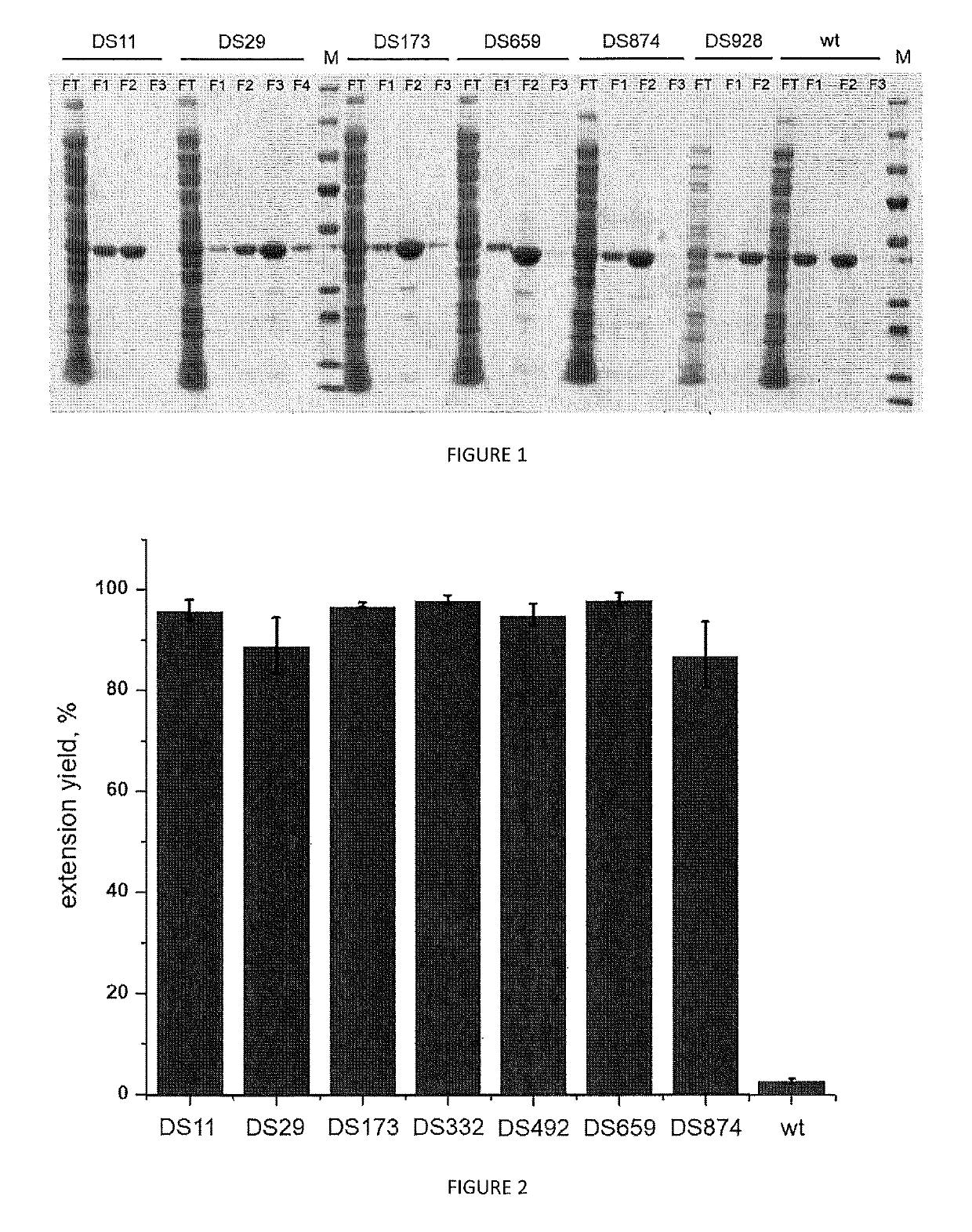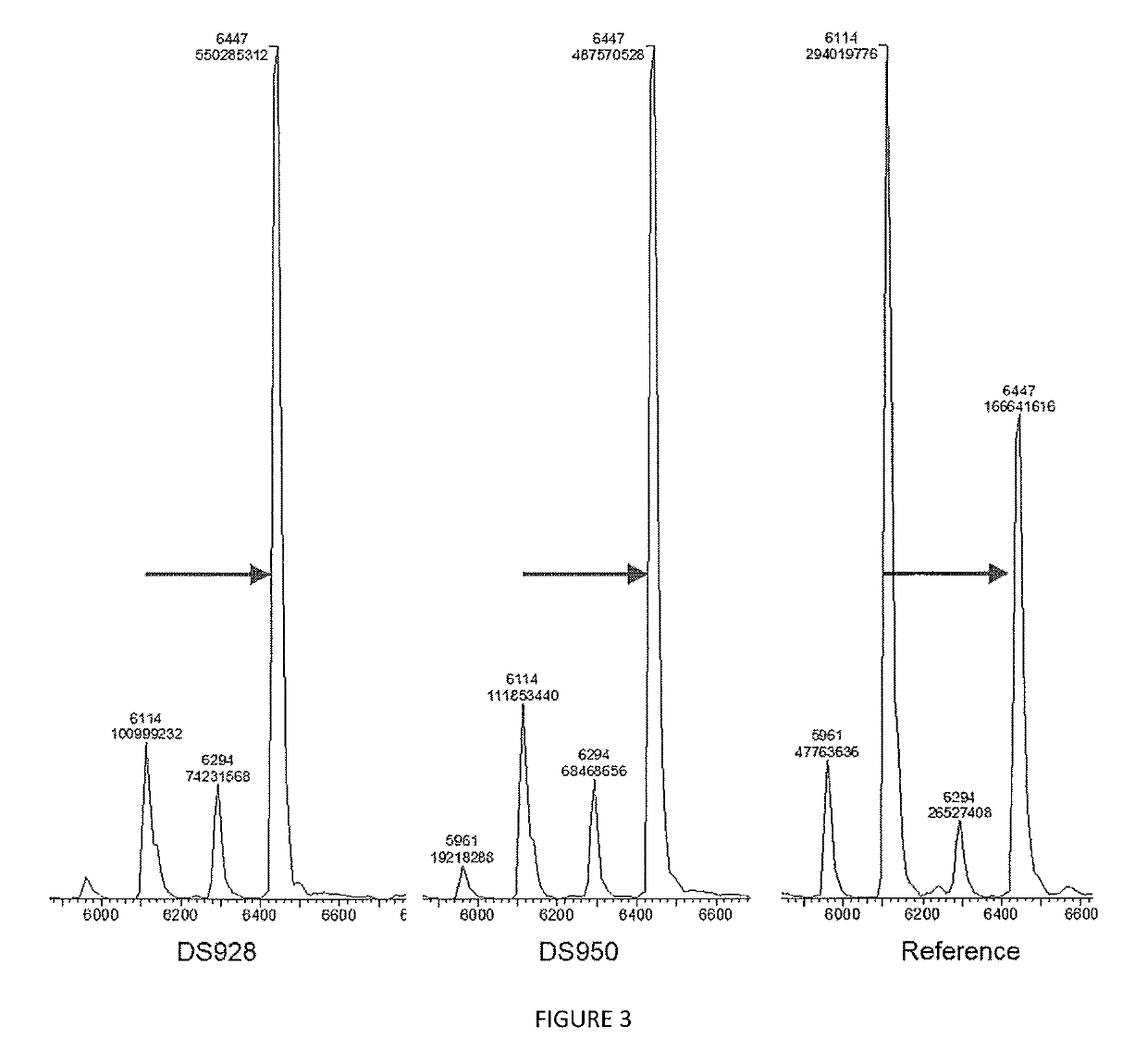Variants of terminal deoxynucleotidyl transferase and uses thereof
a terminal deoxynucleotidyl transferase and terminal deoxynucleotidyl transferase technology, applied in the field of terminal deoxynucleotidyl transferase, can solve the problems of inefficient incorporation of modified nucleotides, uncontrolled synthesis of nucleic acids, and inability to synthesize oligonucleotides, so as to improve the ability of such modified
- Summary
- Abstract
- Description
- Claims
- Application Information
AI Technical Summary
Benefits of technology
Problems solved by technology
Method used
Image
Examples
example 1
n, Expression and Purification of Variants of TdT According to the Invention
[0151]Expression Strain Generation
[0152]The TdT mouse gene has been generated from the pET28 plasmid described in [Boule et al., 1998, Mol. Biotechnol. 10, 199-208]. Sequence SEQ ID Nº 4 (Tag TdT) has been amplified by using the following primers:[0153]T7-pro: TAATACGACTCACTATAGGG (SEQ ID Nº 5)[0154]T7-ter: GCTAGTTATTGCTCAGCGG (SEQ ID Nº 6)
[0155]through standard molecular biology techniques. The sequence is then cloned into plasmid pET32 backbone to give the new pCTdT plasmid.
[0156]After sequencing pCTdT is transformed into commercial E. coli cells, BL21 (DE3, from Novagen). Growing colonies on plate with kanamycin are isolated and named Ec-CTdT.
[0157]Polymerase Variants Generation
[0158]The pCTdT vector is used as starting vector. Specific primers comprising one or several point mutations have been generated from Agilent online software (http: / / www.genomics.agilent.com:80 / primerDesignProgram.jsp). The commer...
example 2
n of the Activity of Variants of TdT with Fluorescent Primers
[0166]Activity Test
[0167]Elongation performance of variants DS11 DS29, DS173, DS659, DS874 from table 1 generated, expressed and purified according to example 1 is evaluated through the following assay. All the results are compared with each other and with the wild type TdT enzyme (SEQ ID Nº 1) and to a control tube lacking any polymerase enzyme.
[0168]
TABLE 3Activity testReagentConcentrationVolumeH2O—12 μLActivity Buffer10× 2 μLdNTP250 μM 2 μLPurified enzyme 20 μM 2 μLFluorescent primer DNA500 nM 2 μL
[0169]The Activity buffer comprises, for example, TdT reaction buffer (available from New England Biolabs) supplemented with CoCl2. Primer used is the following:
[0170]5′-AAAAAAAAAAAAAAGGGG-3′ (SEQ ID Nº 7)
[0171]The primer has also an ATTO fluorescent dye on the 5′ extremity.
[0172]Nucleotides used (noted as dNTP in table 3) are 3′-O-amino-2′,3′-dideoxynucleotides-5′-triphosphate (ONH2, Firebird Biosciences) such as 3′-O-amino-2...
example 3
n of the Activity of Variants of TdT with Unlabeled Primer
[0177]Activity Test
[0178]Elongation performance of variants DS928 and DS950 from table 2 generated, expressed and purified according to example 1 was evaluated through the following assay. All the results are compared with a reference variant (SEQ ID Nº 9) obtained from previous research and to a control tube lacking any polymerase enzyme.
[0179]
TABLE 4Activity testReagentConcentrationVolumeH2O—12 μLActivity Buffer10× 2 μLdNTP250 μM 2 μLPurified enzyme 20 μM 2 μLFluorescent primer DNA500 nM 2 μL
[0180]Primer used is the following:
[0181]5′-TTTTTTTTTTTTAAATAAGG-3′ (SEQ ID Nº 8)
[0182]Nucleotides used (noted as dNTP in table 4) were 3′-O-amino-2′,3′-dideoxynucleotides-5′-triphosphate (ONH2, Firebird Biosciences) such as 3′-O-amino-2′,3′-dideoxyadenosine-5′-triphosphate for example.
[0183]For each variant tested one tube was used for the reaction. The reagents were added in the tube starting from the water and then in the order of Ta...
PUM
 Login to View More
Login to View More Abstract
Description
Claims
Application Information
 Login to View More
Login to View More - R&D
- Intellectual Property
- Life Sciences
- Materials
- Tech Scout
- Unparalleled Data Quality
- Higher Quality Content
- 60% Fewer Hallucinations
Browse by: Latest US Patents, China's latest patents, Technical Efficacy Thesaurus, Application Domain, Technology Topic, Popular Technical Reports.
© 2025 PatSnap. All rights reserved.Legal|Privacy policy|Modern Slavery Act Transparency Statement|Sitemap|About US| Contact US: help@patsnap.com


